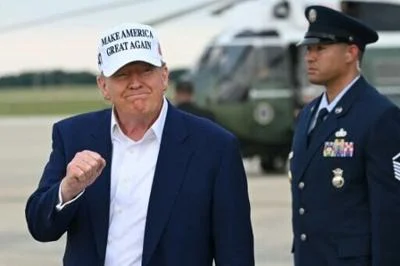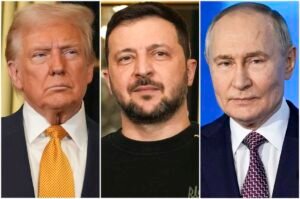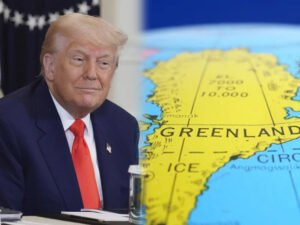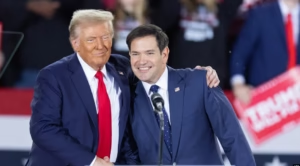Recent developments in world politics have taken another sharp twist as former President Donald Trump publicly criticized Vladimir Putin’s renewed military campaign in Ukraine. The Republican leader’s harsh words about Russia’s current offensive represent a significant shift in his previously measured tone regarding the ongoing conflict.
Trump’s comments came during press statements where he described Putin as having “gone crazy” over the Russian leader’s decision to escalate military operations. These remarks paint Putin in stark terms that differ notably from Trump’s earlier diplomatic approach toward Russia throughout his presidency and subsequent political career.
Trump Calls Putin ‘Crazy Sharp Words Signal Policy Shift
The former president’s language marks perhaps his most direct criticism of Putin since the conflict began in early 2022. Trump specifically called the Russian leader “crazy” while discussing the latest phase of military operations targeting Ukrainian infrastructure and civilian areas across multiple regions.
According to https://www.theguardian.com/world/2025/may/26/ukraine-war-briefing-zelenskyy-doing-his-country-no-favours-putin-has-gone-crazy-trump-says, Trump also expressed concerns about Russia’s strategic direction under Putin’s leadership. The former president suggested that continued military aggression could eventually lead to Russia’s complete downfall on the world stage.
Strategic Implications of Trump’s Position
Political analysts point toward several possible explanations for Trump’s increasingly critical stance toward Putin’s military strategy. The timing coincides with growing international pressure on world leaders to take firmer positions regarding the ongoing conflict in Eastern Europe.
Trump’s warnings about Russia’s potential “downfall” reflect broader concerns about the long-term consequences of prolonged military engagement. Economic sanctions continue to strain Russia’s resources while international isolation grows deeper with each passing month of continued conflict.
Key factors influencing this shift include:
- Growing domestic pressure for stronger anti-Russia rhetoric
- International alliance building ahead of potential future diplomatic roles
- Recognition of Putin’s strategic miscalculations in Ukraine
Trump Calls Putin ‘Crazy: Impact on Future US-Russia Relations
These latest comments could shape future diplomatic relationships between Washington and Moscow, particularly if Trump returns to political office. His characterization of Putin as “crazy” represents language that could complicate any potential future negotiations between the two nuclear powers.
Foreign policy experts worry about the implications of such personal attacks between major world leaders. Direct criticism of foreign heads of state often creates lasting diplomatic tensions that extend beyond individual political administrations and affect bilateral relationships for years afterwards.
Meanwhile, Trump’s prediction about Russia’s potential downfall suggests deeper strategic thinking about long-term geopolitical consequences. This perspective aligns with broader Western intelligence assessments regarding Russia’s declining international influence and economic stability under current military spending levels.
Trump Calls Putin ‘Crazy: Ukrainian Response and International Reactions
Ukrainian leadership has welcomed Trump’s stronger criticism of Putin’s military strategy, though President Zelenskyy continues to seek broader international support for defensive operations. The Ukrainian government views these comments as potentially helpful in building broader American political consensus for continued assistance.
European allies have also taken notice of Trump’s evolving position on the conflict. NATO members particularly appreciate any signs of continued American commitment to opposing Russian territorial expansion, regardless of which political party controls Washington in future election cycles.
However, some diplomatic sources express caution about the wisdom of personal attacks between world leaders. Professional diplomacy typically avoids such direct character assessments, preferring to focus on policy disagreements rather than personal criticism of foreign officials and their decision-making processes.
Looking Ahead: Political and Military Consequences
Trump’s latest statements about Putin could influence the Republican party’s positioning on Ukraine policy going forward. Many party members have previously supported more cautious approaches toward direct confrontation with Russia, making Trump’s harsh criticism particularly significant for future policy debates within conservative circles.
The military situation continues to evolve daily, with fresh reports of casualties and infrastructure damage across contested regions. Putin’s forces have intensified operations despite growing international condemnation and economic pressure from multiple countries and international organizations worldwide.
Trump’s warning about Russia’s potential downfall reflects a growing consensus among Western analysts that prolonged military engagement could ultimately weaken Putin’s domestic position. Economic strain from military spending combined with international isolation creates significant long-term risks for Russian political stability under the current leadership.
Conclusion: A New Chapter in US-Russia Tensions
Trump’s decision to publicly call Putin “crazy” marks another escalation in rhetoric between American and Russian leadership. These comments represent perhaps the strongest personal criticism Trump has directed toward the Russian president throughout their complicated political relationship spanning multiple years.
The implications extend beyond immediate diplomatic concerns to broader questions about future American foreign policy toward Russia. Whether these comments reflect temporary political positioning or permanent policy shifts remains unclear, but they certainly signal growing American impatience with Russia’s continued military operations.








Be First to Comment